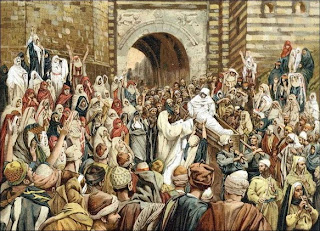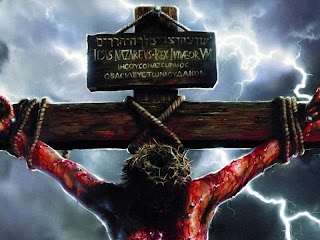 Why would Jesus ask these questions? Didn't Jesus already know the answers? Was Jesus simply testing the disciples or driving home a point? Or, was Jesus in His human side beginning to feel the strain of wondering if He was making a difference - that is, was His message really sinking into the minds and hearts of the people or at least the disciples?
Why would Jesus ask these questions? Didn't Jesus already know the answers? Was Jesus simply testing the disciples or driving home a point? Or, was Jesus in His human side beginning to feel the strain of wondering if He was making a difference - that is, was His message really sinking into the minds and hearts of the people or at least the disciples?
Consider what the context reveals. Jesus miraculously feeds 5,000 (Luke 9:12-17). It's at this point Jesus asks the question, "Who do the people say that I am?" Was Jesus wondering if the people were there simply for a hand out? Or, was He frustrated that it seemed the crowds follow Him not because of His message but for meals and healing?
 The disciples' answer that for the most part, the people thought Jesus was a great prophet from the past that had been resurrected. This was not the right perception! Certainly, they noted his power and authority as derived from God, but the answer reflects the people truly didn't understand who Jesus was. That had to have been frustrating to the one who created all things and spent months traveling around and proclaiming the message of the Kingdom of God.
The disciples' answer that for the most part, the people thought Jesus was a great prophet from the past that had been resurrected. This was not the right perception! Certainly, they noted his power and authority as derived from God, but the answer reflects the people truly didn't understand who Jesus was. That had to have been frustrating to the one who created all things and spent months traveling around and proclaiming the message of the Kingdom of God.
Jesus then asks His disciples who they thought He was. Peter responds, "the Christ of God." (Luke 9:20). He gets it; at least in part. Jesus is the Messiah, the anointed one the Old Testament prophets spoke about. Jesus was not just another prophet come back to life, He is The Christ.
But then Jesus reveals something which must have been hard for the disciples to wrap their minds around, "The Son of Man must suffer many things and be rejected...and be killed and be raised up on the third day." (9:22). Occasionally, today, we might hear a person might remark that Jesus didn't know what was going to happen to Him. But the reality is, Jesus knew very well the cost He was taking on when He came to this world. He knew of His own suffering, His own pain, His own death, His own grave, and His own resurrection. Everyday He walked on the earth He knew His purpose and mission.
Perhaps with the weight of this reality on His soldiers Jesus wondered just how well the disciples understood this. Perhaps He wondered if it would transform their lives. Maybe He considered if His message would translate into fundamental changes of life priorities.
Notice what Jesus says next, "If anyone wishes to come after Me, he must deny himself, and take up his cross daily and follow Me. "For whoever wishes to save his life will lose it, but whoever loses his life for My sake, he is the one who will save it. "For what is a man profited if he gains the whole world, and loses or forfeits himself? "For whoever is ashamed of Me and My words, the Son of Man will be ashamed of him when He comes in His glory, and the glory of the Father and of the holy angels" (Luke 9:23-26).
Jesus is the very example of self-sacrifice. His whole reasoning for coming was to give His life so others might live. In the same way those who will follow Jesus, must follow Him completely. When Jesus quizzes the disciples regarding who the people and the disciples themselves perceive Jesus to be, Jesus seems to be getting at the heart of the issue. 'Do you truly grasp who I am, what my purpose is, and what it takes to follow me?'
Perhaps Jesus is frustrated because the crowds seem to be following Him solely for the benefit of food and good health rather than seeking to follow Him for who He is. Perhaps this is why the next scene finds Jesus appearing with Elijah the great prophet and Moses the great law giver with the voice of God enveloping Peter, James and John with the momentous message: "This is My Son, My Chosen One, listen to Him" (Luke 9:35).
 Jesus' miracles were not done simply to awe crowds. They were done to reveal who Jesus is. Jesus did not come to win crowds over simply for the sake of gaining a following. He did these things to reveal His deity, His power, and His being so that we might choose to give up our own wills and follow Him with a whole heart. Jesus wanted to know it would make a difference in how people lived their lives.
Jesus' miracles were not done simply to awe crowds. They were done to reveal who Jesus is. Jesus did not come to win crowds over simply for the sake of gaining a following. He did these things to reveal His deity, His power, and His being so that we might choose to give up our own wills and follow Him with a whole heart. Jesus wanted to know it would make a difference in how people lived their lives.
If Jesus asked you the question today, "Who do you say that I am?" What would your answer be? Does your answer make a difference in your life?
www.benbrookchurchofchrist.com

